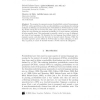Free Online Productivity Tools
i2Speak
i2Symbol
i2OCR
iTex2Img
iWeb2Print
iWeb2Shot
i2Type
iPdf2Split
iPdf2Merge
i2Bopomofo
i2Arabic
i2Style
i2Image
i2PDF
iLatex2Rtf
Sci2ools
JOLLI
2006
2006
A Note on the Expressive Power of Probabilistic Context Free Grammars
We examine the expressive power of probabilistic context free grammars (PCFGs), with a special focus on the use of probabilities as a mechanism for reducing ambiguity by filtering out unwanted parses. Probabilities in PCFGs induce an ordering relation among the set of trees that yield a given input sentence. PCFG parsers return the trees bearing the maximum probability for a given sentence, discarding all other possible trees. This mechanism is naturally viewed as a way of defining a new class of tree languages. We formalize the tree language thus defined, study its expressive power, and show that the latter is beyond context freeness. While the increased expressive power offered by PCFGs helps to reduce ambiguity, we show that, in general, it cannot be decided whether a PCFG removes all ambiguities.
| Added | 13 Dec 2010 |
| Updated | 13 Dec 2010 |
| Type | Journal |
| Year | 2006 |
| Where | JOLLI |
| Authors | Gabriel G. Infante López, Maarten de Rijke |
Comments (0)

